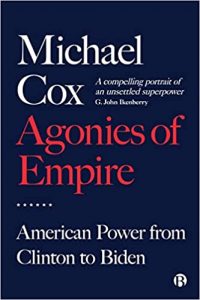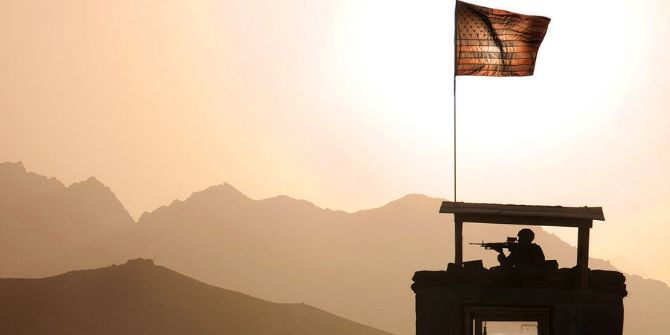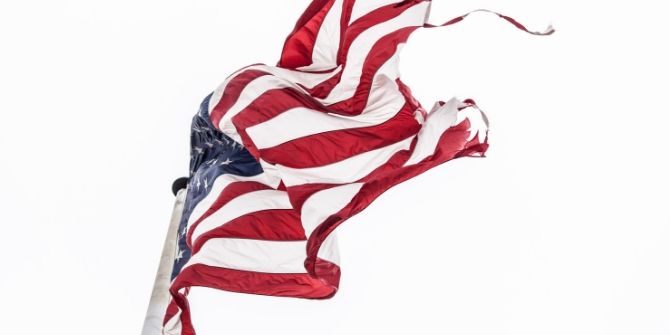In Agonies of Empire: American Power from Clinton to Biden, Michael Cox offers a selection of essays on the US and its empire, reflecting on its transitions under five US Presidents from Bill Clinton to Joe Biden. Drawing on Cox’s influential scholarship on the US and the Soviet Union, this timely collection is at its most powerful when tracing the emphasis by the White House on the domestic over the international, writes Caroline Kennedy-Pipe.
Agonies of Empire: American Power from Clinton to Biden. Michael Cox. Bristol University Press. 2022.
Judgments on the President
 Find this book (affiliate link):
Find this book (affiliate link):![]()
Michael Cox has spent a lifetime thinking, writing and debating the vital issues of our time. A scholar of the US and the Soviet Union, Cox has inspired a number of collections as well as authoring many books and articles. His studies of Cold War endings and new beginnings (or so we thought) were also related to the heady years leading to a resolution of the ‘Troubles’ in Northern Ireland. Perhaps it was only Cox, in his 2006 co-edited book A Farewell to Arms?, who could tie that vexed local process to sustained American influence through the personality and drive of US President Bill Clinton. Despite the scandals dogging him at home, Clinton functioned in Northern Ireland as a ringmaster to end 30 years of violence and create a settlement that few had envisaged. The usual characterisation of the Northern Ireland conflict had been ‘intractable’.
Despite this success, not all was rosy in the garden of US foreign policy. Indeed, after excitement over the ‘end of history’, the Clinton years were marked by a series of failures: in Mogadishu, Rwanda and Bosnia. A colleague of Cox, Mary Kaldor, produced the ‘New Wars’ thesis which marked the widespread gloom hanging over the business of war throughout the 1990s. Ethnic conflict, genocide and NATO ineptitude, as in the ghastly siege of Srebrenica, rightly stood in correction to any euphoria at ‘winning’ the Cold War.
That pessimism was lifted by the ‘successes’ in Kosovo. That war, in which NATO did not suffer a single combat fatality, spawned a raft of musings over the shape of future conflicts which would herald an era of war at a distance, remote, virtual or virtuous war. Crucially this was the age in which Russia had been muted.
The shock of 9/11 transformed the political landscape, and in the US ameliorated the aversion to ‘boots on the ground’. 9/11 was followed by the invasion of Afghanistan and Iraq. The Afghan conflict became America’s longest war, lasting two decades and challenging the four men who followed Clinton into the White House.
These years are gone but not forgotten, at least not by Cox. In Agonies of Empire, he has turned his considerable back catalogue into a timely selection of the ‘best of Cox’ on the US and its empire. These essays bring together his reflections on the various Presidents. As we confront the realities of the ongoing war in Ukraine, the optimism of the early Clinton years seems but a distant memory in terms of the (at least superficially) jovial relationship between former Russian leader Boris Yeltsin and his friend Bill.

Image Credit: Photo by Tim Mossholder on Unsplash
Here Cox is at his most powerful tracing the emphasis by the White House on the domestic over the international. There was a misunderstanding of the emerging forces within Russia swamping the increasingly vulnerable figure of Yeltsin as he floundered and failed; indeed, he failed. Yet, how realistically could he have stopped the expansion of NATO when the peoples of Poland or the Czech Republic saw their future as tied to a Western model rather than the dismal failures of Communism? How could he have prevented a Ukraine turning West? Clinton, so adept in the politics of Northern Ireland, seemed not to recognise or care for the consequences of these humiliating blows.
Cox may demur, pointing to the occasions on which Clinton attempted to work with Russia. We can respectfully disagree: but the cavalier misreading of those who would come after Yeltsin was clear. In one telling vignette, Yeltsin warned Clinton of the ambitions of Vladimir Putin to restore greatness and retake former Soviet strategic turf. Again, there may be disagreement here. Cox has argued that Putin was not always hostile to NATO, who even suggested that Russia might join that alliance. Maybe so, but then that missed moment, in tandem with Putin’s offer to aid the US in its ‘War on Terror’, might have been utilised as an opportunity for a reset.
Cox argues that despite the missteps taken by its Presidents, there has been a remarkable vitality to the American project and its ability to survive and reinvent itself. We should not be surprised by this observation. Despite the agonies of the defeat in Vietnam, a war which cost over 58,000 American lives and engendered much introspection, the US went on to ‘win’ the Cold War. It was the USSR, mired in its Afghan ‘bleeding wound’, that collapsed. The US also survived the disastrous Iraq War. That ‘dumb war’, as Barack Obama apparently named it, spawned not just a military defeat but the rise of ISIS and the consequences that followed in Syria. That, though, is not the central concern for Cox: rather, he poses the question of what makes the US robust? Unique? Special?
To that issue of specialness. Writing self-consciously as a Brit, Cox bats away any notion that we on this side of the Atlantic should rely, as we often have, on our special relationship with Washington (we need only think of Tony Blair on the eve of the invasion of Iraq). This may make some readers uneasy that the UK is easily put to one side, but we should pause and take note of Cox.
Special only goes so far. The chaotic, poorly communicated and executed exit from Kabul in 2021 is but one example. Whatever the merits of maintaining a small force, the obvious consequences for women and the plight of those Afghans who had worked with the Western presence, President Joe Biden had already decided to cut and run. This despite the hesitancy of his Generals. Waving their concerns to one side, the deal with the Taliban agreed in Doha was honoured even as allies argued for a less drastic course.
The Afghan deal was arranged by Donald Trump as the most divisive and controversial President of the five examined here. Colourful, charismatic and chaotic, it is difficult to find positive views of Trump, at least in most liberal circles. Despite Trump’s mishandling of the COVID-19 pandemic, the border walls, the immigrant crisis and endemic social unrest, Cox speculates as to whether Trump did as much damage to the Office of the Presidency as some have argued. Is he to be judged against one of the ‘worst’ American presidents of all – Andrew Jackson – or might a second term soften the judgment of history?
Agonies of Empire went to press as the Biden administration was in its infancy. Biden threatens to be judged alongside Gerald Ford for the clumsiness, both physical and political, which characterised that one-time accidental President. Cox hints that this may be unfair and leaves us with food for thought: would Trump have been so restrained in the case of Putin’s war in Ukraine, let alone his threat to use nuclear weapons? With the clock ticking to the next presidential election, who remains in or takes the White House will inherit an enlarged NATO, a nationalistic Russia and the giant of China. Given these circumstances, I wonder what Cox might write next?
Note: This review gives the views of the author, and not the position of the LSE Review of Books blog, or of the London School of Economics and Political Science. The LSE RB blog may receive a small commission if you choose to make a purchase through the above Amazon affiliate link. This is entirely independent of the coverage of the book on LSE Review of Books.







